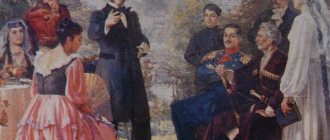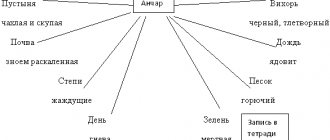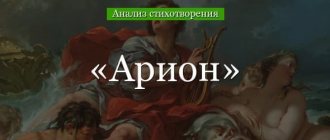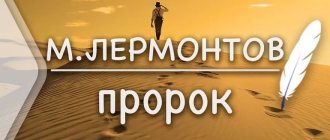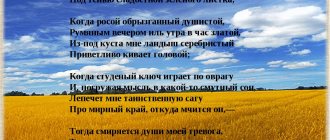History of creation
A.S. Pushkin began writing the work in 1819. The first half of the 19th century was associated with increasing discontent among the population, which demanded the abolition of serfdom, so many literary figures touched on the topic of slavery in their works. The poem "Village" is also among them.
Pushkin refused to publish the original version of the work, because he always approached the creation of poems with the trepidation of a perfectionist. In 1825, the poet decided to publish his revised creation, but due to recent events in Russia, which forced the authorities to tighten censorship (the Decembrist uprising in 1825), amendments had to be made to the text. In 1826 the poem was published under the title "Solitude". The “full version” of the work was published only in 1829.
The history of the creation of the poem
As noted above, the poem belongs to the second, St. Petersburg period of the poet’s work and was written in 1819. Active social and political life, secret meetings with the Decembrists, communication with Chaadaev and Ryleev - everything influenced the theme of the poem “Village”. The analysis of Pushkin's poem includes the poet's statements about the despotism of autocracy, about the political and social lack of freedom of people, about the inhumanity of serfdom.
Genre, direction, size
- It is impossible to single out one specific genre in the work. It contains both a message (an appeal to the village) and an elegy (reflections on life, sad reflections on modern society, the pronounced melancholy of the lyrical hero).
- It is also impossible to unambiguously determine the direction. Romanticism in the work is felt from the first lines: the hero idealizes nature, condemns society and despises civilization. He finds himself in solitude and dwells in detail on the state of his inner world. At the same time, the author focuses on social issues that are not characteristic of romanticism. He describes in detail the problems of serf Russia and does it without embellishment, dwelling on the most brutal manifestations of the “wild lordship.” These are signs of realism. The work relates to both landscape poetry (description of pictures of rural nature) and philosophical poetry (reflections on the difficult situation of peasants, on the essence of life, on freedom). Most often, such works are classified as freedom-loving lyrics.
- The poem “Village” is written in iambic hexameter, all types of rhyme are clearly visible in it: cross, ring, parallel.
Composition and poetic meter
The poem is written in the form of an oratorical speech in which the poet expresses the thoughts and ideas of progressive people of his time. The story begins with an appeal to the beauty of the village and a description of the idyll. Such an introduction is absolutely consistent with oratorical speech. Continuing to develop his thoughts in the chosen style, the poet builds the second and third stanzas in the same way. He uses the same technique in the second part, starting stanzas with the word “here.” The abundance of exclamatory and interrogative sentences is also determined by the oratorical style. Pushkin turns to such a compositional structure for a reason. His poem is a call not only in content, but also in form. This is an open speech that demands the elimination of injustice that arose centuries ago.
A structural analysis of Pushkin’s “Village” allows us to conclude that the poem is written in iambic hexameter alternating with iambic tetrameter. The rhyme is cross, male rhyme (1st, 3rd lines) alternates with female rhyme (2nd, 4th lines).
Composition
According to its meaning, the poem “Village” can be divided into two parts.
- In the first, the lyrical hero enjoys meeting his favorite “desert corner” and admires the beauty of the “peaceful” landscapes. He wanders through familiar places, pays attention to every detail, feels all the smells, hears all the sounds. In this region, the lyrical hero finds spiritual harmony. He gets rid of the bustle, noisy balls, meetings and, alone with nature, comprehends the great truths of existence (“I am learning to find bliss in the truth”).
- In the second part of the poem, the lyrical hero talks about what thought darkens his soul. “Among the flowering fields and mountains” it is impossible not to notice the miserable life of the peasants, their eternal suffering. Weak-willed, ignorant, enslaved, they are forced to work for other people, having no right to their own opinion, or to hopes, or to decent living conditions. At the end of the work, the poet’s desperate cry is heard. He dreams of seeing those days when, “at the king’s behest,” slavery will leave this corner, and a free, happy life will begin for these poor people.
Images and symbols
The works of A.S. Pushkin are full of many images and symbols.
- Thus, in the center of the work there is a multi-valued image of the Russian village
. For the lyrical hero, this is not only the embodiment of spiritual harmony, admiration for the beauty of nature, peace, discovery of truths, but also a reflection of a terrible page in the history of Russia - slavery. Among the landscape views, it is impossible not to notice the poverty of the peasants, forced to work hard for the benefit of the “wild nobility.” One cannot help but sympathize and sympathize with their weak-willed life. Therefore, the lyrical hero experiences internal contradiction, being in the “shelter of work and inspiration,” but seeing injustice, grief and fear around him. - The image of the lyrical hero
is revealed in his ideological position - “friend of humanity.” He is a conscientious and virtuous poet who does not even believe that he is endowed with the gift of speech, because his lines are powerless against tyranny. His sensitive heart suffers from the fact that injustice reigns around. But he not only regrets, he tries to correct the mistakes of society, directing all his powers of reflection to create a powerful call that will awaken people and force them to abandon slavery. He sacrifices fun and pleasure in order to direct all his energy to work. Thus, the lyrical hero dedicates his lyre to the people, and his willingness to devote himself to public needs is an excellent motivating example for the nobility of that time. No wonder the Decembrists loved Pushkin so much and the Tsar was so afraid. - The image of the “wild lordship”
is presented in all its glory: these are people without honor and conscience, indifferent to the grief of others. They corrupt peasant girls “for an insensitive whim,” and force their brothers and fathers to work, which exhausts their strength. But the owner is inexorable, and the fate of the people does not bother him; he appropriated it, as a robber does. - The image of the peasantry
is painted in gloomy colors: “slavery is meager,” “ignorance is a murderous shame,” “a painful yoke drags everyone to the grave.” People are deprived of will, they have no right even to hope, because at any moment a lordly whim can cross out their lives. In such an atmosphere of hopelessness, there is no incentive to strive for anything, so the peasantry itself cannot save itself from captivity. “Crowds of exhausted slaves” are doomed to extinction. - The image of Russia
has an emphasized duality. On the one hand, there is a city where vices and vanity flourish. Fun is equated with delusion, and the author emphasized the illusory nature of light by mentioning Circe, the heroine of the ancient Greek legend, who deceived the famous Odysseus into captivity. He contrasts this Russia with another - the countryside, where the “wild lordship” pushes around with “meager slavery” and spreads poverty, ignorance, and impoverishment on Russian lands. The author clearly shows the relationship between two worlds: while undeserved idleness blooms in one, in the other the working people are strained by an unbearable burden.
Themes, moods, problems
The poem “Village” by A.S. Pushkin has multifaceted themes and topical issues.
- The main theme is the duality of village life
. On the one hand, it is beautiful and joyful there, on the other, it is poor and gloomy. The contentment of nature is opposed to the need of the robbed peasants. All the results of their labor are accumulated by the masters and wasted in their endless wasteful game. The author described all aspects of life in the Russian hinterland and brought together its contradictions in one elegy. - From the very first lines, the inextricable connection between man and nature
. The lyrical hero finds harmony with himself among calm landscapes, among native species. They are the ones who awaken his creative powers. He contrasts the beauty of the countryside with the bustle of the city and concludes that his place is in the outback, where he can think and create freely. If nature gives, then civilization in the form of a city takes away; if in the village the poet finds his muse and listens to the oracles, then outside it he is bound by the conventions of society and blinded by its illusions. - The surrounding environment sets him up for philosophical reflection. He thinks about the truths of life: you cannot envy a fool, you must live and think freely, never listen to the grumbling of the “unenlightened crowd” (the themes of freedom, the poet and the crowd
). The hero, being alone with himself, is freed from prejudices and misconceptions. He gains wisdom and strength to reach people. - In the second part of the poem, the main problem is raised - slavery and tyranny
that shackled the village. The lyrical hero describes the horrors of the weak-willed life of a dependent person, the lawlessness and depravity of his owner. He sympathizes with the peasant, but finds that this is not enough. He understands that the solution to the problem must be sought not even in poetry, which is powerless to influence everyone, but in politics. He calls on the monarch to influence the situation, but doubts that he will live to see that day. - Another important problem is the powerlessness of the poet and poetry
. The author bitterly admits that he is not able to reach people and help slaves free themselves. He complains about the “sterile heat” that flared up in his soul, and regrets his inability to solve social problems with the gift of persuasion. Only the heavy hand of a monarch can create change, but will it be his will? Hardly. - The mood
in the poem is dual: in the first part it is filled with the joy of discovery and internal transformation, and in the second it is imbued with sympathy and regret: not only about the fate of the peasants, but also about one’s own helplessness.
Analysis of Pushkin's poem "Village"
In the poem “Village,” Pushkin expresses his dissatisfaction with serfdom. To more clearly and sharply emphasize all the injustice and cruelty of serfdom, Pushkin uses the technique of opposition in constructing the poem. The first part of the poem contains a bright, peaceful picture of the village. Expressing great love and warmth, Pushkin conveys here his thoughts about rural nature, about the silence that disposes him to study science and poetry. All this causes a surge of creative energy in the poet and cleanses him morally. Next, we observe a sharp transition to the second part of the poem, in which Pushkin speaks with indignation about the powerless situation of the peasantry oppressed by the serfs.
Calling himself a “friend of humanity,” Pushkin conveys to the reader lines about the “wild nobility” that forcibly “appropriated to itself the labor, property, and time of the farmer.” The basis for the merciless exploitation of the peasantry was the economy and well-being of the ruling class in the feudal-serf state.
All this touches the poet to the depths of his soul, and the result is the bitter words: “Oh, if only my voice could disturb hearts!” He longs to see “an unoppressed people” and the “beautiful dawn of enlightened freedom” rising over his country.
The poem "Village" as a whole represents the passionate speech of a poet-citizen, ardently expressing the views and feelings of the people of that time. This is achieved using a number of poetic techniques. The poem begins with an appeal to the village, which is quite typical for oratorical speech. In the second and third stanzas the construction is the same: “I am yours: I exchanged... I am yours: I love this dark garden...” In the second part of the poem the same oratorical technique of repetition is used: “Here is a wild lordship... Here is skinny slavery... Here is a painful yoke... Here are maidens young..." Oratorical techniques also include the presence of exclamatory and interrogative sentences at the end of the poem.
The first part of the poem is distinguished by a calm, even, friendly intonation of speech. The poet carefully selects epithets that perfectly convey the beauty of rural nature. The village for Pushkin is “a haven of peace, work and inspiration.” He loves the “peaceful sound of oak trees”, “the silence of the fields”, “the dark garden with its coolness and flowers”, “the meadow covered with fragrant stacks”, “the azure plains of two lakes”. Each epithet is either colorful (“the azure plains of two lakes”; “striped fields”) or emotionally evaluative (“free idleness”, “free soul”).
In the second part the intonation changes. Speech takes on an excited look. The poet selects apt epithets, he gives an expressive speech description: “wild lordship”, “chosen by fate for the destruction of people”, “an inexorable owner”.
The influence of classicism is clearly noticeable in the poem “Village”; it is observed in the tone of speech - upbeat, oratorical, in the use of Slavicisms (sei, bosom, fisherman, painful yoke, etc.), ancient images (“court of Circus”, “oracles of centuries” ).
Along with the article “Analysis of Pushkin’s poem “Village”” read:
Analysis of Pushkin's poem "Prophet"
main idea
The main idea of the poem is a condemnation of serfdom and an exposure of the structure of Russian society. The lyrical hero sympathizes with the peasant, who is forced to carry his heavy burden to the grave, exhausted in constant work for his owner. He watches as these “crowds of exhausted slaves” increase. The hero looks with sadness at the state of life of the common people, strives to alarm the “hearts” with his voice, but all in vain: either he is not endowed with such a gift, or the people themselves are deaf to the prophet, because the pleasures and delusions of the city do not allow them to think about the fate of the country.
The meaning of the author’s position is not difficult to understand: Pushkin deliberately praises the village, where it is so good to think and create. This is a hint that the elite simply cannot see life in Russia without leaving their luxurious chambers. Only in the lap of nature can you listen to yourself and understand where you should direct your strength and capabilities. There, a person can clearly see how the working peasantry doomed to poverty lives. All these conditions and impressions will prove more effectively than the poetic word the need for change.
Means of expression
In the poem “Village” A.S. Pushkin used various paths, without which a detailed analysis of the work is impossible.
- The main means of artistic expression is contrast. At the beginning of the work, the poet draws peaceful pictures of nature in the village, which inspire him to create works, and then he describes the “dark” part of his corner - slavery. In the last part, terrible pictures of the life of serfs appear, their hard work is depicted.
- Antitheses are widespread: “wild lordship” collides with “skinny slavery”; the contentment and abundance of nature is contrasted with the shameful need in which the peasants live.
- In these parts, special attention should be paid to the epithets: “peaceful noise of oak trees” and “skinny slavery”, “bright streams” and “crowds of exhausted slaves”.
- The poet also uses personification: streams are rustling, “moving pictures” are everywhere.
- Equally common are metaphors: the village is “a haven of peace, work and inspiration”, “winged mills”, “a bosom of happiness and oblivion”.
Author: Anastasia Smetanova
Means of artistic expression
The main means of artistic expression in “The Village” is antithesis - it helps to reveal the author’s intention. Pushkin designs the first part in such a way that the reader is immersed in an atmosphere of calm. This is created thanks to the epithets: “peaceful noise”, “silence of the fields”, “azure plains”.
The second part of the work is more emotional, Pushkin is dissatisfied and even outraged by the current situation. From this follows many words with a bright emotional connotation, mainly epithets: “wild lordship”, “relentless owner”, “destroyer of people”, “burdensome with a yoke”. With the help of anaphora (in the second part of the poem, the lines begin several times with the word “Here”), Alexander Sergeevich tries to list everything that he is dissatisfied with, to express all the ugliness that he observes.
Author: Polina Batraeva
Interesting? Save it on your wall!
